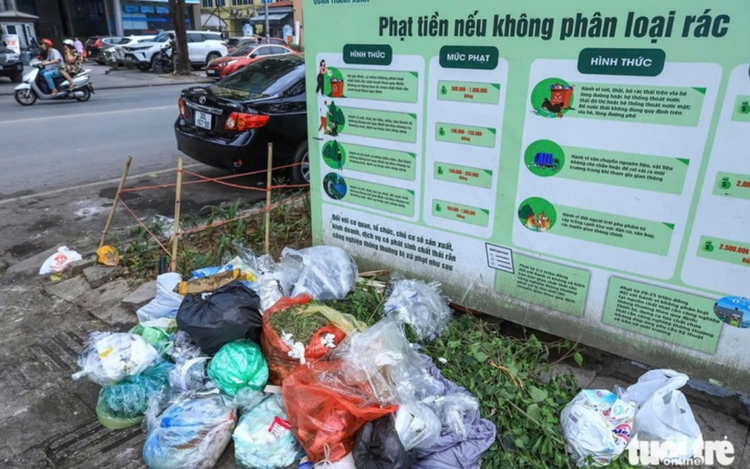
Hanoi warns of penalties for failing to sort garbage, but various types of waste continue to be dumped on sidewalks. Photo: Danh Khang / Tuoi Tre
The proposal is currently open for public and organizational feedback.
The draft regulation outlines a gradual increase over the next two years.
Currently, under Decision 54 issued in December 2016, residents in Hanoi's wards pay VND6,000 ($0.22) per person per month, equivalent to VND24,000 ($0.88) for a four-person household, while those in communes pay VND3,000 ($0.11), or VND12,000 ($0.44) per household.
Under the draft, starting from 2025, the monthly waste collection fee in the wards would spike to VND21,000 ($0.8) per person, followed by a further increase to VND43,000 in 2026.
Meanwhile, in the communes, the rate would jump to VND10,000 ($0.38) in 2025 and to VND23,000 ($0.87) in 2026.
For businesses, organizations, production facilities, and industrial clusters, the fee will be calculated based on the actual volume of waste generated, at a proposed rate of VND1,175 ($0.04) per kilogram.
Hanoi authorities explained that the fee adjustment is necessary due to the wide gap between current revenue and the actual cost of waste management.
According to the municipal Department of Finance, the total waste collection revenue in 2024 was nearly VND568 billion ($21.6 million), while actual expenses neared VND2.3 trillion ($87.5 million) -- four times higher.
The shortfall has long been covered by the city budget.
Compared to other localities, Hanoi’s waste fees are significantly lower.
Ho Chi Minh City charges VND84,000 ($3.2) per household per month, while Hai Phong City and Hung Yen Province collect VND40,000 ($1.5), and up to VND60,000 ($2.2) per household, respectively.
In Da Nang City, central Vietnam, each household must pay VND30,000 ($1.14) for waste fees.
The Hanoi administration underscored that the proposed increase aims to ease pressure on the municipal budget and promote greater public responsibility in waste reduction and separation.
The gradual adjustment also aligns with the national policy of ‘paying according to the amount of waste generated.’


Max: 1500 characters
There are no comments yet. Be the first to comment.